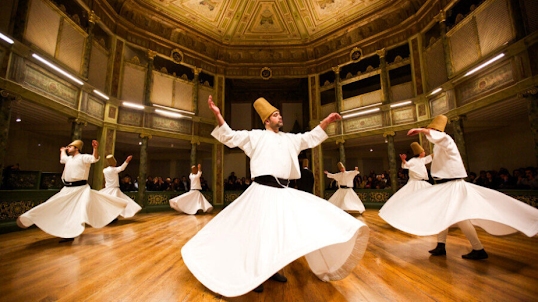Having lost touch with its glorious heritage of classical scholarship, the Muslim world today is divided in squabbles between two opposing camps, who despite their respective deviations, are both attempting to usurp the right to represent orthodox Islam. The Wahhabis and Salafis are the product of a British strategy to undermine Islamic tradition and create fundamentalism. While the Sufis are their most vocal and articulate critics, rightly pointing out their corruptions, they themselves are part of a similar conspiracy, again with close ties to Western intelligence and the occult.
The New Age movement, following the teachings of a leading disciple of H. P. Blavatsky, believes that the coming of the Age of Aquarius will herald the beginning of world peace and one-world government, headed by the Maitreya, who is said to be awaited also by Christians, Jews, Buddhists, Hindus and Muslims, though he is known by these believers respectively as Christ, Messiah, the fifth Buddha, Krishna or Imam Mahdi. The New Age’s expectation of the Mahdi awaited by the Muslims has been nurtured through its relationship with Sufism.
Essentially, the pretext of the occult is that in the future the world will be united in peace by eliminating all sectarianism, when the world will be brought together under a single belief system. The basis of that belief will be the occult tradition, which it is claimed has been the underlying source of all exoteric religions. As such, since at least the middle of the eighteenth century, occultists have marketed Sufism as being the origin of Freemasonry.
According to Idries Shah, the twelfth century Qadiriyya Sufi order was the origin of the Rosicrucians, the most important occult movement after the Renaissance, who later evolved into the Freemasons. As detailed in Black Terror White Soldiers, the Rosicrucians were responsible for orchestrating the advent of Sabbatai Zevi, who took the Jewish world by storm in 1666 when he declared himself their expected messiah. However, Zevi disappointed the vast majority of his followers when he subsequently converted to Islam. Nevertheless, an important segment followed him into Islam as well, and to this day consist of a powerful community of secret Jews known as Dönmeh.
The Dönmeh of Turkey maintained associations with a number of Sufi orders, like Whirling Dervishes founded by Jalal ad-Din Rumi, and the Bektashis. Strongly heretical, the Bektashi venerated Ali, the son-in-law of the Prophet Mohammed, repudiated many of the legal rulings of Islam, and combined Kabbalistic ideas with elements of ancient Central Asian shamanism.
Through the influence of Bektashi Sufism, the Dönmeh developed the belief of Pan-Turkism, later adopted by the Young Turks, a Dönmeh and Masonic organization responsible for overthrowing the Ottoman Caliphate in 1908. Pan-Turkism begins with Alexander Csoma de Körös (1784 – 1842), the first in the West to mention mysterious Buddhist realm known as Shambhala, which he regarded as the origin of the Turkish people, and which he situated in the Altai mountains and Xinjiang.
Csoma de Körös’s mention of Shambhala became the basis of the mystical speculations offered by H. P. Blavatsky, which she regarded as the homeland of the Aryan race. Blavatsky founded the Theosophical Society, and came to be regarded as an oracle of Freemasonry and the godmother of the occult. Blavatsky became largely responsible for initiating the popularity of Buddhism as a font of the Ancient Wisdom. However, contrary to popular perceptions, Tibetan Buddhism is a strange amalgam of Buddhist ideas, along with Hindu Tantra and Central Asian shamanism, it was for this reason that Blavatsky regarded it as the true preservation of the traditions of magic. (more...)

No comments:
Post a Comment